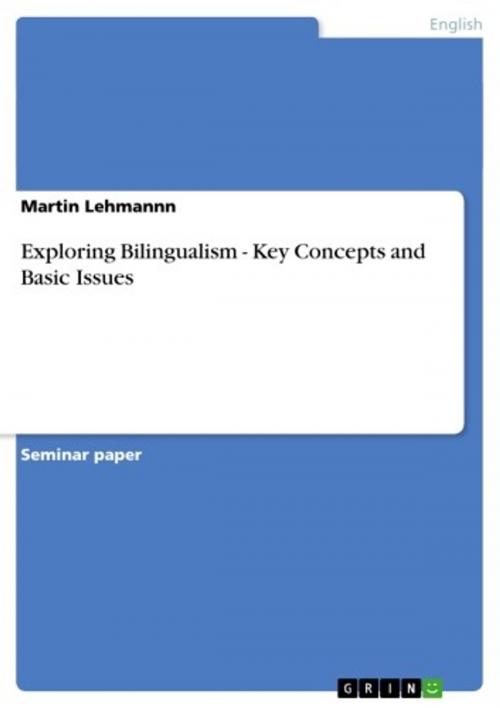Exploring Bilingualism - Key Concepts and Basic Issues
Key Concepts and Basic Issues
Nonfiction, Entertainment, Drama, Anthologies| Author: | Martin Lehmannn | ISBN: | 9783638381987 |
| Publisher: | GRIN Publishing | Publication: | May 31, 2005 |
| Imprint: | GRIN Publishing | Language: | English |
| Author: | Martin Lehmannn |
| ISBN: | 9783638381987 |
| Publisher: | GRIN Publishing |
| Publication: | May 31, 2005 |
| Imprint: | GRIN Publishing |
| Language: | English |
Seminar paper from the year 2005 in the subject English Language and Literature Studies - Linguistics, grade: 1,0, Free University of Berlin, course: First and Second Language Acquisition, 38 entries in the bibliography, language: English, abstract: [...] This extract from the Book of Genesis is perhaps the oldest recorded attempt to explain the thrilling diversity of languages in the western societies. Moreover, the tale of the Tower of Babel is probably the best-known story about language among ordinary citizens. Though virtually everyone has heard about Babel at some point, only few would link it to the concept of 'multilingualism' or be able to give an exact definition of the term. Scholars, on the other hand, have not come up with a universally accepted definition so far, either. The term 'multilingualism' is used here synonymously with 'bilingualism' and therefore applied in its broadest sense. For the time being, we consider as multilingualism / bilingualism the competence in more than one language or, in other words, we 'encompass both the individuals who are fluent in two languages only and those whose linguistic repertoire consists of three or more languages'. Admittedly, this definition is rather inaccurate and vague. In the course of this work we will therefore seek for a much more elaborate understanding of bilingualism / multilingualism. But let us go back to the biblical story for a moment. Unfortunately, a negative attitude towards different languages, which is implicitly expressed in the curse of Babel, is nowadays still widely held when it comes to judging bilinguals and bilingualism. Even in this day and age many people see the simultaneous occurrence of several languages in one place not as a blessing but as an aberration. To them, monolingualism is the norm and hence the natural way of life. However, if we direct our attention to facts rather than fiction, it becomes immediately clear that multilingualism is neither abnormal nor unnatural. Instead, as BHATIA / RITCHIE veraciously state, '[b]ilingualism, - more generally, multilingualism - is a major fact of life in the world today.' For a start, let us consider the domain of economics. The process of globalisation as well as improved travel opportunities have been causing increased mobility throughout the world. It is thus becoming a smaller place and interactions between people of different nations and cultures are getting much more frequent than in the past. As a result, ever more individuals are required to speak two or more languages. Despite these recent developments, the need to communicate with people who do not speak the same language as oneself is probably as old as history itself. [...]
Seminar paper from the year 2005 in the subject English Language and Literature Studies - Linguistics, grade: 1,0, Free University of Berlin, course: First and Second Language Acquisition, 38 entries in the bibliography, language: English, abstract: [...] This extract from the Book of Genesis is perhaps the oldest recorded attempt to explain the thrilling diversity of languages in the western societies. Moreover, the tale of the Tower of Babel is probably the best-known story about language among ordinary citizens. Though virtually everyone has heard about Babel at some point, only few would link it to the concept of 'multilingualism' or be able to give an exact definition of the term. Scholars, on the other hand, have not come up with a universally accepted definition so far, either. The term 'multilingualism' is used here synonymously with 'bilingualism' and therefore applied in its broadest sense. For the time being, we consider as multilingualism / bilingualism the competence in more than one language or, in other words, we 'encompass both the individuals who are fluent in two languages only and those whose linguistic repertoire consists of three or more languages'. Admittedly, this definition is rather inaccurate and vague. In the course of this work we will therefore seek for a much more elaborate understanding of bilingualism / multilingualism. But let us go back to the biblical story for a moment. Unfortunately, a negative attitude towards different languages, which is implicitly expressed in the curse of Babel, is nowadays still widely held when it comes to judging bilinguals and bilingualism. Even in this day and age many people see the simultaneous occurrence of several languages in one place not as a blessing but as an aberration. To them, monolingualism is the norm and hence the natural way of life. However, if we direct our attention to facts rather than fiction, it becomes immediately clear that multilingualism is neither abnormal nor unnatural. Instead, as BHATIA / RITCHIE veraciously state, '[b]ilingualism, - more generally, multilingualism - is a major fact of life in the world today.' For a start, let us consider the domain of economics. The process of globalisation as well as improved travel opportunities have been causing increased mobility throughout the world. It is thus becoming a smaller place and interactions between people of different nations and cultures are getting much more frequent than in the past. As a result, ever more individuals are required to speak two or more languages. Despite these recent developments, the need to communicate with people who do not speak the same language as oneself is probably as old as history itself. [...]















